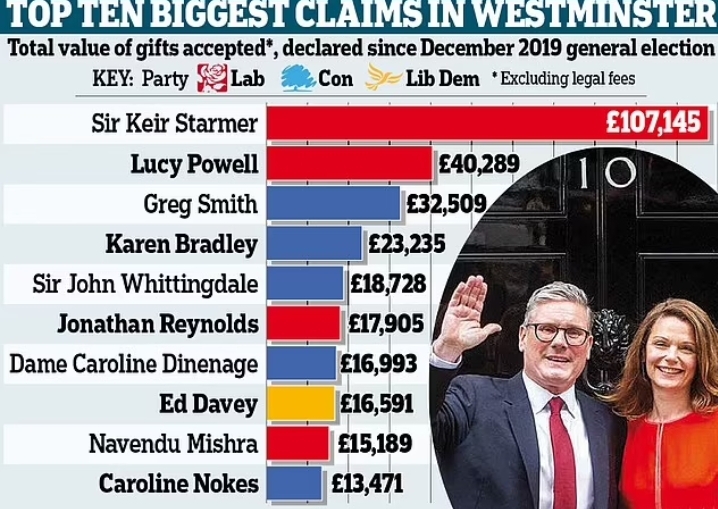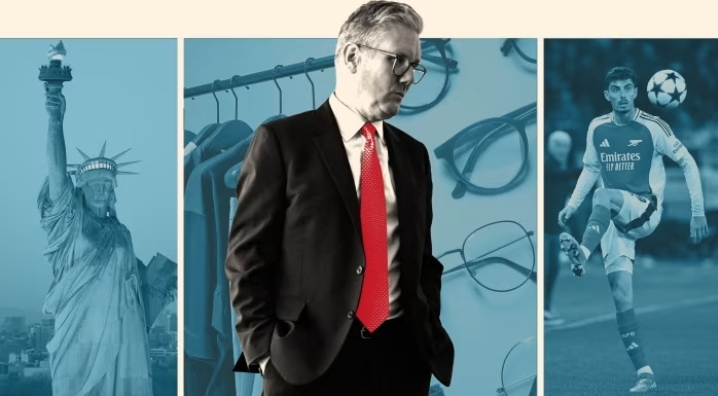Luxury for me, scraps for thee: Starmer’s brilliant plan to survive the Cost-of-Living crisis

Here
In the midst of a crippling cost-of-living crisis, as millions of UK citizens struggle to heat their homes and put food on their tables, Prime Minister Sir Keir Starmer has flaunted his indulgence in luxury and high-end living. His repayment of over £6,000 in gifts and hospitality, after a significant backlash, exposes the uncomfortable truth about the growing divide between the elites and the people they claim to represent.
While ordinary citizens pinch pennies and rely on food banks, Starmer thought it appropriate to accept luxury Taylor Swift concert tickets, VIP access to Doncaster races, and a lavish clothing rental for his wife, Lady Starmer. These aren’t the actions of a man who understands or empathizes with the hardships his citizens face daily. Instead, they paint the picture of a politician detached from reality, more concerned with his millionaire lifestyle than with offering real solutions to the growing crisis.
The hypocrisy becomes even more glaring when Starmer, the head of the Labour Party—the party that claims to stand for the working class—insists there is "no money" to invest in public services, to help the vulnerable, or to ease the burden of the cost-of-living crisis. As families face soaring energy bills, shrinking wages, and rising food prices, Starmer chose to spend nearly £2,800 on Taylor Swift tickets alone—just a small portion of the gifts he received but felt pressured to repay.

Here
When questioned, the prime minister insists that he has "done nothing wrong" and that no rules were broken. This is the political double-speak the public has come to expect from elites like Starmer. Rules or not, it is a matter of basic morality. How can someone entrusted with public welfare accept such extravagant donations while his government fails to provide adequate support to those in need?
Starmer’s latest promise to "tighten the rules" around ministerial hospitality feels like an empty gesture. If he truly believed in the integrity of public service, he wouldn’t have accepted the gifts in the first place. And what about the other Labour MPs and cabinet members, many of whom have accepted equally lavish freebies? Will they follow Starmer’s lead and repay their spoils, or will they continue living it up while the people they’re supposed to serve face increasing hardship?
Critics are right to question why Starmer repaid the donations only after the public backlash reached fever pitch. It suggests that transparency and accountability are not principles he values unless forced into action. The excuse that his donations came from "well-meaning donors" rings hollow when we consider the overall optics—wealthy donors win favour while the average citizen is left to fend for themselves in the harsh realities of modern Britain.
This episode reveals a disturbing truth about Sir Keir Starmer's leadership: he is far more comfortable in the world of luxury, privilege, and millionaires than in addressing the everyday struggles of the people. It’s a betrayal of the very values Labour once stood for—a party that claimed to champion the underdog now seems complicit in their suffering.

Here
At a time when the country cries out for empathetic leadership, Starmer’s actions show his priorities lie elsewhere. His millionaire lifestyle and cozy relationship with the ultra-wealthy suggest that his government will continue to ignore the pressing needs of the public while basking in privilege. His attempts to appear more transparent or ethical after the fact feel like nothing more than political theatre, a hollow performance for a public desperate for real solutions.
As the cost-of-living crisis deepens, many will wonder: does Sir Keir Starmer represent them, or has he become just another out-of-touch politician who puts wealth and power above all else? His recent behaviour provides a deeply unsettling answer.